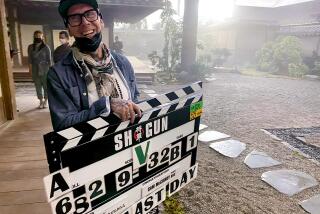Japan Will Love Tora-san 40--Just Like the Other 39
- Share via
TOKYO — Move over “Rocky IV” and “Superman IV,” you’ve been outdone by the most unlikely of competitors, a funny-looking but warm-hearted Japanese trinket peddler whose fictional travels are so beloved here that edition No. 40 just opened at movie theaters over the holidays.
“It’s Tough Being a Man,” with its gentle story and bittersweet ending, first came out 20 years ago and was a gigantic hit. Like clockwork since then, new ones bearing the same name have appeared twice a year, on Christmas Eve and again every August, when families traditionally take annual holidays.
According to Shochiku Co. Ltd., which produces the films, 67 million people--half of Japan’s population--have seen Tora-san, the traveling salesman whose experiences in a simpler, kinder Japan of the not-so-distant past seem to provide a soothing, nostalgic antidote for the harried, intensely regulated and money-driven life style many Japanese lead today.
Through 40 films the story line is always reassuringly familiar: Tora-san, a bit rough around the edges but well-meaning, takes to the road after quarreling with his relatives, who operate and live behind a Japanese sweets shop.
As he travels from one Buddhist temple fair to another, hawking his trinkets to make a living, he invariably meets and falls in love with an attractive woman.
Just as invariably, he is unable to declare himself and loses her to someone else. Heartbroken, Tora-san takes to the road again, a bittersweet ending that the Japanese, with sensibilities tending toward the tragic, always appreciate.
The newest Tora-san, “Memorial Day of Salad” (opening soon at Little Tokyo Cinema), is basically no different, except that in a bow to modernity, the woman this time is a doctor. “It’s a completely romantic view. It’s all about a never-never land that did exist in Japan in the 1950s but doesn’t exist now. It’s utterly gone,” says Donald Richie, an expert on Japanese film.
The appeal of the Tora-san movies is obviously not just their simple and sentimental plot, but the atmosphere and time they conjure up. Tora-san and his relatives, all but one played by the same actors for the last 20 years, are full of the expressions, concerns, folk superstitions, manners and good-heartedness of Japan 30 years ago.
They are honest, willing to persevere against life’s difficulties (a particularly prized virtue in Japan) and hard-working. None of them is rich, but they all manage to get by. None of them expects life to be much more than it is, and they are content where they are.
Such a “profoundly conservative” theme, as Richie put it, might frustrate an American audience but is one that resonates with older Japanese in particular. “It’s a popular theme in many countries, but the Japanese have institutionalized it,” he says.
For many Japanese, watching Tora-san, played by Kiyoshi Atsumi, is like seeing a relative or neighbor from years ago, long before anyone could see Japan as an economic powerhouse, long before shop owners began playing the stock market or striking deals by investing in real estate, as they do today.
Tora-san’s clothing says it all: Clad always in the same unstylish, brown plaid, double-breasted suit, he wears a stomach sweater around his midsection as many Japanese used to do to ward off illness, a good-luck charm firmly strung around his neck and two-toed worker’s socks and thongs on his feet. He is the antithesis of today’s Tokyo jet-setting, designer-tag-sporting chic.
Tora-san made his first appearance in 1968 in a television series. The show was short-lived, with the hero being killed off by a snakebite. Fans were furious, and soon afterward the first Tora-san movie, “It’s Tough Being a Man,” appeared, kicking off what no one at the time suspected would be such a hugely successful series of films using the same name.
Tora-san’s director, Yoji Yamada, who has made a career out of the movie series, says the films have been so popular because they represent a brief escape for many Japanese from the rigidity of life in economically driven postwar Japan.
“Tora-san is a man who lives freely. He has dropped out of the managed, controlled society,” Yamada says. “I think his free way of life is a kind of utopia that normal people dream of living but can’t do themselves.” Tora-san simply picks up his well-worn bag when the mood strikes and goes.
But Yamada acknowledges that the number of Japanese who can relate to that message is declining. Younger people, products of affluent Japan, have enough money to indulge their whims and travel desires and thus don’t need an escape.
The rigidities that have carefully governed life and career here for the last 40 years are also beginning to soften somewhat, as companies begin to offer two-day weekends, life styles become more flexible and people slowly begin to want more from life than nonstop work.
As a result, young people might start to view Tora-san not as a warmly nostalgic movie, but as irrelevant and antiquated. “In Japan, movies such as ‘Rambo,’ ‘Top Gun’ and ‘The Right Stuff’ have been very popular, enjoying tremendous success. Tora-san is the opposite of that,” Yamada says. “The Tora-san type of human being is decreasing in Japan, and people are less accepting of this kind of person.”
In fact, it is U.S. movies that are the real blockbusters here, easily surpassing the 2 million viewers that a Japanese-made movie must attract to be declared a big commercial hit.
Every Tora-san movie has surpassed the 2 million threshold, according to the film company, but by comparison, “E.T.” attracted 12 million people to movie theaters in Japan.
“Western movies spend a lot more money, and so they are a lot more romantic and invite a lot more fantasy from viewers” than Japanese movies, which seem decidedly low-tech in comparison, according to Hiroshi Onishi, a spokesman for the Shochiku movie company.
Tora-san No. 40, for instance, cost only about $3.5 million to $4 million to make, and lead actor Atsumi reportedly was paid less than $250,000--a far cry from the salaries that American stars command.
And while some U.S. films can take several years to go from conception to the screen, Tora-san takes a matter of months. Filmed entirely in a studio near Tokyo that was built in 1936 and bears a strong resemblance to a dank dungeon, Tora-san No. 40 was still in production--still being filmed, in fact--nine days before its official release date.
“Foreigners always ask that question: ‘How it is possible?’ ” Onishi says. “But we have been filming and editing Tora-san movies for 20 years, twice a year, and really it’s not very difficult. We film and we edit all at the same time. Everyone knows exactly what to do, because we have done it many times before.”
Director Yamada, a soft-spoken man with slightly graying hair who somehow finds time to direct other films, says he does not find it dull or repetitive to continually write (along with others) and direct more or less the same story time and again.
“If I get fed up with it, I’ll stop right away,” he said recently, as all around him assistants rushed around a cramped, dusty and decidedly low-tech Tora-san set.
How many more Tora-sans will there be? “My intention never was to make a series, so even now one never knows,” he says. “But the actors grow old. So how long this can continue? That is my agony.”
More to Read
Only good movies
Get the Indie Focus newsletter, Mark Olsen's weekly guide to the world of cinema.
You may occasionally receive promotional content from the Los Angeles Times.










